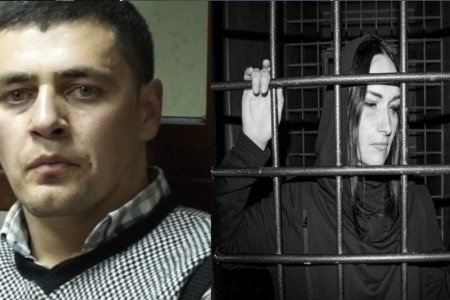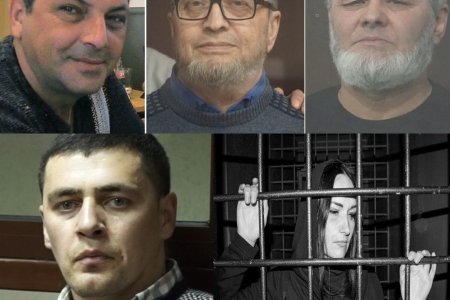
Imprisoned Crimean Solidarity journalist Amet Suleimanov has been removed from the waiting list for a vital heart valve replacement without which his life is in immediate danger. Russia is already jeopardizing the Crimean Tatar political prisoner’s life by holding him in the appalling conditions of a Russian penal institution and have now demonstrated that they have no intention of saving his life.
In September this year, Suleimanov’s wife, Lilia Liumanova sent a formal request for information to the Crimean occupation ‘health ministry’ regarding her husband’s place in the queue for a heart valve replacement. On 21 October, she received a formal, and immensely cynical, answer, saying that her husband should “come in person with the relevant documents for examination and a subsequent decision regarding an operation.” What this clearly means, Lilia says, is that Amet has been removed from the queue. Whatever the ‘waiting list’ is that the occupation ‘officials’ mention, this is evidently very much further down the line as far as chances of receiving the life-saving surgery.
Lilia has lodged a complaint with the occupation ‘prosecutor’s office’. She explained to Crimean Solidarity that when Amet was first placed on the queue for surgery, they were given a code and told that they could check his place online. That, in fact, never happened due to problems with the system, but they did have it in writing that he was in the queue for surgery. Furthermore, she says, in September or October 2022, she received a phone from the same occupation ‘health ministry’, saying that Amet was reaching the front of the queue and that they should be ready. They were told then that it would be in a month or two, by the end of the year, certainly, that he would be called.
Amet Suleimanov was already a political prisoner by then, however even the Russian FSB had understood, after arresting him on 11 March 2020, that he would not survive to the end of the ‘trial’ if placed in detention, and he remained under house arrest until April 2023. He and his family were therefore immensely relieved that the operation seemed imminent, and he received permission from the Southern District Military Court in Rostov (in charge of the house arrest) for him to leave his home for the medical tests, etc. and to ensure that there were no medical obstacles to his hospitalization.
The promised call did not come. In February or March 2023, Lilia rang the ‘health ministry’ and was told that her husband was indeed on the list, but that he had, purportedly, “refused the operation”. She assumed then that this was some kind of misunderstanding, and that they simply needed to wait.
In violation, among other things, of an order from the UN’s Committee Against Torture to refrain from imprisoning Suleimanov, the Russian prison service took him away on 5 April 2023. He was eventually taken to Russia’s Vladimir prison where his health has, as feared, sharply deteriorated.
As reported, Lilia was allowed a brief meeting with Amet in August 2024, and also spoke with the head of the prison medical service. She was told that medics had sent a request to Moscow for Suleimanov to be operated on in a cardiology hospital. There was, however, no formal confirmation of the application, nor any details about a likely timeframe.
It is possible that there really was an application. The doctors are, after all, fully aware of Suleimanov’s physical state, with one doctor even finding the courage to provide a truthful assessment. The list of conditions documented included two illnesses that are on Russia’s list of conditions which constitute grounds for releasing him from custody. The assessment, when compared with that obtained earlier, also confirmed the deterioration in Suleimanov’s condition.
As reported, and as all Russians implicated in his persecution are aware, Suleimanov suffers from chronic rheumatic heart disease, aortic insufficiency, coronary artery disease and third level mitral valve prolapse. He had needed a heart valve transplant even before his arrest in March 2020, and had been forced to suspend his journalist work for the Crimean Solidarity human rights initiative because of his worsening state of health.
Suleimanov’s case highlights the brutality of Russia’s supposed ‘justice system’, especially where Ukrainian political prisoners are concerned, and the degree to which all players, including medics, are implicated. After the above-mentioned accurate medical examination, a penal system medical commission was called, with this clearly understanding what was required and claiming that there were no impediments to Suleimanov’s ongoing imprisonment. This was used to ‘justify’ the rejection by the Frunze district court in Vladimir on 26 June 2024 to release Suleimanov because of his state of health.
In May 2024, Suleimanov suffered a hypertensive crisis, with the huge spike in blood pressure causing constant nosebleeds, dizziness and breathlessness. The chronic heart conditions have also resulted in vascular problems, yet he spent a month just trying to get the prison service to hand over the medication that his wife sends for him. He is now receiving the medication for chest pain and for high blood pressure, but not other vital medication, including a drug for thinning the blood, although the enforced immobility in the prison puts Suleimanov at even greater risk of blood clots. The doctors are clearly aware of this as he was even issued with blood thinning medication for a short time, with this then stopping with no explanation provided.
The refusal to release Suleimanov, despite the near certainty that imprisonment will kill him, came a day after the European Court of Human Rights issued a damning judgement in the case of Ukraine v. Russia re Crimea, with many of the violations evident in the persecution of Amet Suleimanov and other Crimean Solidarity civic journalists and activists.
Armed arrests without any crime, falsified ‘evidence’ and horrific sentences
The Russian FSB came for Amet Suleimanov (b. 1984); the two elder sons of a renowned Crimean Tatar historian – Seitumer Seitumerov (1988) and Osman Seitumerov (b. 1992) and their maternal uncle Rustem Seitmemetov (b. 1973) on 11 March 2020.
The charges against the men differed little from the claim of ‘counter-revolutionary terrorist propaganda’, used during Stalin’s Terror to execute the Seitumerov brothers’ great-grandfather. In occupied Crimea, Russia is using a deeply flawed Supreme Court ruling from 2003 to imprison men on ‘terrorism’ charges without even accusing them of a recognizable crime and is targeting journalists and civic activists from the Crimean Tatar human rights movement.
The men are essentially accused only of supposed ‘involvement’ in the peaceful transnational Hizb ut-Tahrir Muslim organization, which is legal in Ukraine and not known to have committed acts of terror anywhere in the world. No proof is even needed of actual involvement in Hizb ut-Tahrir, since the FSB invariably plant ‘prohibited literature’ which they then claim to have found during armed searches which they prevent lawyers from being present at. Illicitly taped and innocuous conversations about religion, Russian persecution, events in Crimea are passed to FSB-‘experts’ who claim that this or that word ‘proves’ involvement in Hizb ut-Tahrir. They also recruit ‘anonymous witnesses’ who invariably repeat the indictment, while proving suspiciously unable to provide any other details about the defendants whom they claim to have known well. All of this is seen and clearly understood by the ‘judges’ who prevent the defence from asking questions which demonstrate that such ‘witnesses’ are lying and that the ‘experts’ have no competence to express an opinion.
Seitumer Seitumerov was charged under the more serious Article 205.5 § 1 of Russia’s criminal code with ‘organizing a Hizb ut-Tahrir group’, while his brother, uncle and Suleimanov were charged with ‘involvement’ in this entirely unproven ‘group’, under Article 205.5 § 2. All of the men were also accused of ‘planning a violent uprising’ (Article 278) although even the FSB admitted that not one of them was suspected of actions or direct plans to commit any action aimed at ‘overthrowing the Russian constitutional order’
Despite the flawed charges, non-existent evidence and the fact that any custodial sentence would kill one of the men, prosecutor Yevgeny Nadolinsky demanded horrific sentences against all four men, including 13 years in the case of Suleimanov (whom he had previously tried to get remanded in custody). On 29 October 2021, three ‘judges’ from the Southern District Military Court in Rostov (Russia) - Igor Kostin (presiding judge); Roman Plisko and Yevgeny Zviagin – largely obliged, sentencing Seitumer Seitumerov to 17 years; Osman Seitumerov to 14 years; Rustem Seitmemetov to 13 years and Amet Suleimanov to 12 years. All of these sentences are for the worst of Russian penal institutions, with the first 3.5 years to be spent in a prison, where the conditions are most shocking.
These sentences were upheld on 9 February 2023, by ‘judge’ Aleksandr Aleksandrovich Mordovin from the Military Court of Appeal in Vlasikha (Moscow region).
We can help ensure that Amet Suleimanov returns to his wife and four sons!
Russia’s criminal procedure code specifically envisages contact between prisoners and the diplomatic representative offices and consular departments of their country in the Russian Federation. Since Ukraine has had no diplomatic relations with Russia since the latter’s full-scale invasion, Ukrainian political prisoners are entitled to contact “with the representative offices or consular institutions of countries which have taken it upon themselves to defend [the prisoner’s] interests, or with inter-state bodies engaged in the defence of such prisoners”.
If you are from or living in an EU country, the USA, Canada or other democratic countries, please ask your foreign ministry to consider playing such a role. It could save Amet Suleimanov’s life.
Please also write letters!
These, unfortunately, need to be in Russian, handwritten, and on ‘safe’ subjects. If that is a problem, use the sample letter below (copying it by hand), perhaps adding a picture or photo.
Sample letter
Привет! Желаю Вам крепкого здоровья и надеюсь, Вы скоро вернетесь домой, к своим родным. Простите, что мало пишу – мне трудно писать по-русски, но мы все о Вас помним.
[Hi. I wish you good health and hope that you will soon be home, with your family. I’m sorry that this letter is short – it’s hard for me to write in Russian., but you are not forgotten. ]
Address (which can be in Russian or English)
600020 Россия, Владимирская обл., Владимир, Большая Нижегородская ул., 67,
ФКУ Т-2 "Владимирский централ"
Сулейманову, Амету Рефатовичу, г.р. 1984
Or in English
600020 Russia, Vladimir oblast, Vladimir 67 Bolshaya Nizhegorodskaya St, Prison No. 2 ‘Vladimir Central’
Suleimanov, Amet Refatovich, b. 1984



